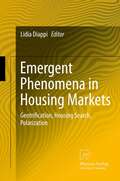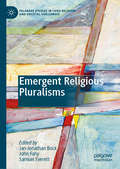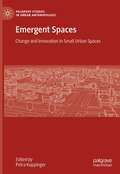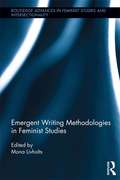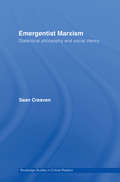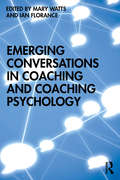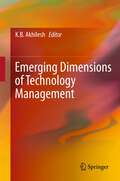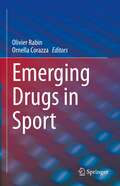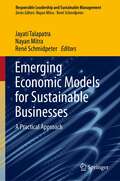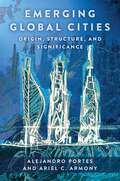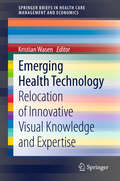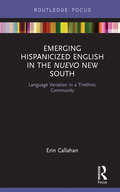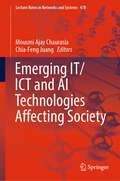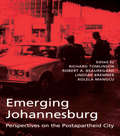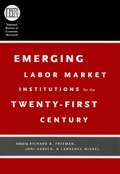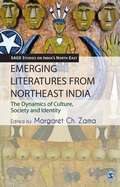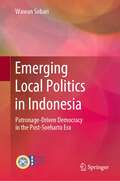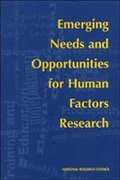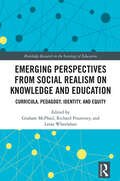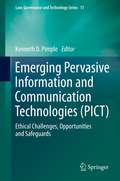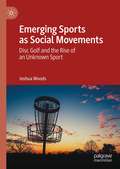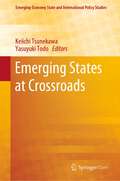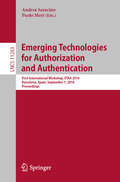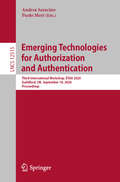- Table View
- List View
Emergent Phenomena in Housing Markets: Gentrification, Housing Search, Polarization
by Lidia DiappiThe housing market, like every market, is the product of thousands of interacting buyers and sellers driven by different interests. But unlike other markets, the housing market is able to profoundly transform the socioeconomic structure and the image of a city. Very often, changes in urban space are the result of the imperceptible operation of a multitude of micro-transformations which act with such great energy and decisiveness that they can transform the 'DNA' of entire urban neighborhoods. These qualitative novelties, unpredictable and non-deducible on the basis of the previous properties, are defined emergences. Namely emergence means a 'pattern formation' characterized by a self-organizing process driven by non-linear dynamics. This book explores housing market emergence in light of three different phenomena: search for housing, social polarization, and gentrification. The book is divided into two parts. The first part presents contributions on modelling emergence of different phenomena, formalised in multi-agent systems. The second part gathers empirical research and analyses aimed at supporting the findings of the models.
Emergent Religious Pluralisms (Palgrave Studies in Lived Religion and Societal Challenges)
by John Fahy Jan-Jonathan Bock Samuel EverettIn a rapidly changing world, in which religious identities emerge as crucial fault lines in political and public discourse, this volume brings together multiple disciplinary perspectives in order to investigate shifting conceptions of, and commitments to, the ideals of religious pluralism. Spanning theology, sociology, politics and anthropology, the chapters explore various approaches to coexistence, political visions of managing diversity and lived experiences of multireligiosity, in order to examine how modes of religious pluralism are being constructed and contested in different parts of the world. Contributing authors analyse challenges to religious pluralism, as well as innovative kinds of conviviality, that produce meaningful engagements with diversity and shared community life across different social, political and economic settings. This book will be relevant to scholars of religion, community life, social change and politics, and will also be of interest to civil society organisations, NGOs, international agencies and local, regional and national policymakers.
Emergent Spaces: Change and Innovation in Small Urban Spaces (Palgrave Studies in Urban Anthropology)
by Petra KuppingerThis book explores different emergent spaces where diverse urbanites spontaneously negotiate, make and remake urban spaces, create opportunities, produce social change, challenge urban life, culture, and politics, or simply ask for their right to the city. The focus of this book is on spaces and contexts where change is seeded, regardless of whether it was planned and whether it was or will be successful in the end. Contributors analyze the seeds of change at their very inception in diverse cultural contexts across four continents. How do small groups of ordinary and often also disenfranchised people design, suggest and implement ideas of change? How do they use and remake small urban spaces to better suit their purposes, voice claims to the city, create opportunities, and design better urban lives and futures? The emphasis of this volume is not on the nature of activities and change, but on the minute processes of initiating change.
Emergent Writing Methodologies in Feminist Studies (Routledge Advances in Feminist Studies and Intersectionality)
by Mona LivholtsContemporary challenges for seeking new knowledge in feminist studies are intimately intertwined with methodological renewal that promotes justice and equality in changing global contexts. Written by some of the leading scholars in their fields, this edited collection focuses on the emergence of writing methodologies in feminist studies and their implications for the study of power and change. The book explores some of the central politics, ideas, and dimensions of power that shape and condition knowledge, at the same time as it elaborates critical, embodied, reflective and situated writing practices. By bringing together a variety of multi/transdisciplinary contributions in a single collection, the anthology offers a timely and intellectually stimulating contribution that deals with how new forms of writing research can contribute to promote fruitful analysis of inequality and power relations related to gender, racialisation, ethnicity, class and heteronormativity and their intersections. It also includes the complex relationship between author, text and audiences. The intended audience is postgraduates, researchers and academics within feminist and intersectionality studies across disciplines in the humanities and social sciences. The book is excellent as literature in feminist studies courses and helpful guidance for teaching writing sessions and workshops.
Emergentist Marxism: Dialectical Philosophy and Social Theory (Routledge Studies in Critical Realism)
by Sean CreavenIn tackling emergentist Marxism in depth, this well-written volume demonstrates that critical realism and materialist dialectics are indispensable to theorizing the functioning of complex social and physical systems. Author Sean Creaven investigates Marx’s dialectics of being and consciousness, forces and relations of production, base and superstructure, class structure and class conflict, and demonstrates how they allow the social analyst to conceptualize geo-history as embodying a tendential evolutionary directionality, rather than as simply random or indeterminate in terms of its outcomes. For those interested in social and political theory, Marxism and communism and contemporary social theory, this outstanding volume is an in important read and a valuable resource.
Emerging Afrikan Survivals: An Afrocentric Critical Theory (Studies in African American History and Culture)
by Kemayo KamauFirst published in 2003. Routledge is an imprint of Taylor & Francis, an informa company.
Emerging Conversations in Coaching and Coaching Psychology
by Mary Watts; Ian FloranceThis rich collection offers new perspectives on the future of coaching and coaching psychology, with insight from a broad range of contributors reflecting a wide variety of viewpoints. It captures the ongoing evolution of coaching practice, inviting contribution to conversations as they unfold. Mary Watts and Ian Florance skillfully bring together authors from backgrounds in law, finance, education, psychology and HR to examine the nature of change and assess current and future developments. Emerging Conversations in Coaching and Coaching Psychology considers influences from within coaching itself, discussing topics including ethics, diversity, supervision and reflective learning, and from other disciplines, assessing the offerings of psychometric assessment, trauma studies and neuroscience. It also considers the impact of social changes as seen in business, education and leadership, and concludes with a look at the future of coaching. This book will be of great interest to coaches and trainee coaches interested in changes and developments in the field, who aren’t afraid to ask questions and who are open to reflecting on their own assumptions and approaches to practice.
Emerging Dimensions of Technology Management
by K B AkhileshTechnology is the key driver of business. May it be airport, ICT , smart governance, manufacturing or plantations. Technology management opens up opportunities for the business and help achieve leadership positions. This collection of papers provides a glimpse of issues faced in different sectors. These papers also should inspire more researchers to expand the scope of the subject itself.
Emerging Drugs in Sport
by Ornella Corazza Olivier RabinAthletes are always aiming to be faster, better, stronger. New techniques to enhance their sporting performance have increasingly been linked to use of novel psychoactive substances (NPS) and other hard-to-detect substances like performance-enhancing drugs. This book offers a timely analysis of the new challenges posed by this phenomenon in the anti-doping community. The authors present the first comprehensive perspective on the rapidly shifting doping scenario and reflect on use, regulation, policy, and market structure of NPS used in sports. They highlight the challenges with the list of prohibited substances and methods in and out of competition. They also evaluate how methods to detect new drugs present an ongoing battle for doping control as they have to be adapted constantly. Topics covered within the chapters include:Contamination of Sports Supplements with Novel Psychoactive SubstancesUntested Supplement Use Among Athletes: An Overlooked Phenomenon?International Drug Control: Protecting the Health of the AthleteAnalysis of New Chemical Entities in a Sport Context Emerging Drugs in Sport establishes a clear benchmark on the policy discussion, drawing from available evidence and sources, including athletes' personal experiences, to generate a fact-based resource that informs a research as well as wider audience. The book is essential reading for those working in anti-doping, substance misuse, sports, ethics, and human enhancement. It also is useful for policy-makers, legislative personnel, and other professionals with an interest in protecting clean sport.“Doping is one of the greatest threats to the integrity of sport. We must never be tempted to turn our back on the problem and hope it will disappear. The benefits and values of clean sport have never been more important to the world. That is why this book with its wide-ranging approach is so valuable.” Thomas Bach, President, International Olympic Committee“Physical activity is vital to a healthy living, which is why doping is not just an assault on fair competition, but also on health. I strongly commend this book for compiling advanced knowledge on performance-enhancing drugs and promoting health through sport.” Tedros Adhanom Ghebreyesus, Director-General, World Health Organization
Emerging Economic Models for Sustainable Businesses: A Practical Approach (Responsible Leadership and Sustainable Management)
by René Schmidpeter Nayan Mitra Jayati TalapatraThe book discusses new and emerging economic models, that respond to 'Pulling' and 'Pushing' forces. Today we are poised at an interesting juncture, with favourable conditions making it easier to be a sustainable organization acting as a ‘Pulling’ Force and the climate crisis, rise in social-economic equities thereby ‘Pushing’ for urgent action. The book analyses economic models that look at value propositions, creation and capture with ‘People, Planet and Profit’ deeply embedded in each stage of the value chain. The contributions bring out the interplay between new standards, evaluation frameworks, technology innovation and other emerging tools to show how they create a sustainable business. For this, they lean on learnings from successful sustainable businesses. Business leaders will find that this book provides deep insights on improving their existing sustainable practices, and speeding up the transition from linear to circular, narrow stakeholder driven to community driven. For prospective entrepreneurs the book provides the nudge needed to start up a sustainable enterprise. Students and researchers can benefit from real-life examples of how sustainable transformations unfold.The book thus creates an easy guide for those willing to make the transition to sustainability, start a sustainable business and most of all, to motivate those who may not yet be convinced about the long-term sense of taking care of our people and our earth.
Emerging Global Cities: Origin, Structure, and Significance
by Alejandro Portes Ariel C. ArmonyCertain cities—most famously New York, London, and Tokyo—have been identified as “global cities,” whose function in the world economy transcends national borders. Without the same fanfare, formerly peripheral and secondary cities have been growing in importance, emerging as global cities in their own right. The striking similarity of the skylines of Dubai, Miami, and Singapore is no coincidence: despite following different historical paths, all three have achieved newfound prominence through parallel trends.In this groundbreaking book, Alejandro Portes and Ariel C. Armony demonstrate how the rapid and unexpected rise of these three cities recasts global urban studies. They identify the constellation of factors that allow certain urban places to become “emerging global cities”—centers of commerce, finance, art, and culture for entire regions. The book traces the transformations of Dubai, Miami, and Singapore, identifying key features common to these emerging global cities. It contrasts them with “global hopefuls,” cities that, at one point or another, aspired to become global, and analyzes how Hong Kong is threatened with the loss of this status. Portes and Armony highlight the importance of climate change to the prospects of emerging global cities, showing how the same economic system that propelled their rise now imperils their future. Emerging Global Cities provides a powerful new framework for understanding the role of peripheral cities in the world economy and how they compete for and sometimes achieve global standing.
Emerging Health Technology
by Kristian WasenThis book reports cutting-edge cases of emerging health technologies. Some health care fields are experiencing paradigmatic shifts because of robotic technologies and the new relationships that they create in r-Health (r-Curing and r-Caring) activities. The book explores emerging health care technologies such as image-guided surgical robotics, pharmacy robots, new visualisation methods (3D, 4D & "5D") and home telehealth management systems and their acceptance in the workplace but also, more generally, their special role in business and society. These technologies allow health care professionals to effectively reach far beyond the current service offerings, providing new methods for communication, diagnosis, and treatment. The relocation of certain knowledge areas from physicians to patients in self-care management or the reconfiguration of health care expertise from one health profession to another are examples of topics developed in this book. The book describes the emerging relocation of innovative visual knowledge and expertise within health care organisations and beyond, such as in the patient's home environment.
Emerging Hispanicized English in the Nuevo New South: Language Variation in a Triethnic Community (Routledge Studies in Sociolinguistics)
by Erin CallahanThis volume provides a comprehensive overview of contemporary language shift and identity in a language community in the mid-Atlantic South to offer a unique window into ethnic dialect formation and sociolinguistic processes underpinning dialect acquisition. Drawing on data collected from over 100 interviews of members North Carolina Hispanicized English speakers in Durham, North Carolina, the book employs a quantitative approach and uses statistical software in analyzing the data collected to focus on the sociolinguistic variable of past tense unmarking to explore sociolinguistic processes at work in English language learner variation. The focus on a specific variable allows for the opportunity to explore specific processes in more detail, including the ways in which speakers accommodate regional and ethnic varieties of their peers and the internal and environmental factors guiding dialect acquisition. Illuminating new facets to the processes of language learning, language contact, and ethnolect emergence, this volume is key reading for students and researchers in second language acquisition and variationist sociolinguistics.
Emerging IT/ICT and AI Technologies Affecting Society (Lecture Notes in Networks and Systems #478)
by Mousmi Ajay Chaurasia Chia-Feng JuangThis book presents the applications of future technologies to overcome the toughest humanitarian challenges from an engineering approach. COVID-19, a worldwide pandemic, has limited many physical operational areas and at the same time has motivated to uplift the initiative to digitalize the world. Society is facing ever more intense and protracted humanitarian crises, and as a result, the global community is pressed to find new ways to help people and communities in need. This interdisciplinary book highlights the exchange of relevant trends and research results as well as the presentation of practical experiences gained while developing and testing elements of technology enhanced learning experiences with the help of emerging technologies like IT/ICT, AI, ML, edge computing, robotics automation, 5G for the betterment of humanity. It highlights the analytics and optimization issues impacting society and technology for example on security, sustainability, identity, inclusion, working life, corporate and community welfare, and well-being of people to create a secure tomorrow.
Emerging Johannesburg
by Richard Tomlinson Robert A. Beauregard Xolela Mangcu Lindsay BremnerJohannesburg is most often compared with Sao Paulo and Los Angeles and sometimes even with Budapest, Calcutta and Jerusalem. Johannesburg reflects and informs conditions in cities around the world. As might be expected from such comparisons, South Africa's political transformation has not led to redistribution and inclusive social change in Johannesburg. In Emerging Johannesburg the contributors describe the city's transition from a post apartheid city to one with all too familiar issues such as urban/suburban divide in the city and its relationship to poverty and socio-political power, local politics and governance, crime and violence, and, especially for a city located in Southern Africa, the devastating impact of AIDS.
Emerging Labor Market Institutions for the Twenty-First Century (National Bureau of Economic Research Conference Report)
by Richard B. Freeman Lawrence Mishel Joni HerschThe text provides an in-depth assessment of how effectively labor market institutions are responding to the decline of private sector unions. This volume provides case studies of new labor market institutions and new directions for existing institutions. While non-union institutions are unlikely to fill the gap left by the decline of unions, the findings suggest that emerging groups and unions might together improve some dimensions of worker well-being. Emerging Labor Market Institutions is the story of workers and institutions in flux, searching for ways to represent labor in the new century.
Emerging Literatures from Northeast India
by Margaret Ch ZamaEmerging Literatures from Northeast India is an amalgam of critical perceptions on writings emanating from the region on issues of identity construct, on hidden colonial burdens that refuse to leave and on the key role that oral traditions continue to play and will do so for some time in any study of the region. Within the ambit of 'emerging' literatures, this book takes into consideration not only the new writings in English and the vernacular being generated from the region, but also the already existing works in the form of translations, thereby making such works accessible for the first time to the rest of the world. Moreover, the book, in critiquing and calling attention to the emerging literatures of the region, is also playing the larger role of providing access to and facilitating the opening up of the region through the academia.
Emerging Local Politics in Indonesia: Patronage-Driven Democracy in the Post-Soeharto Era
by Wawan SobariThis book provides a richer understanding of democratic local politics in Indonesia after the implementation of local direct elections in 2005. Co-published with the University of Airlangga Press, it confronts the question as to why incumbent political leaders succeed and fail in their bid for re-election. By focusing on urban and rural districts in East Java, one of the most populated regions in Indonesia, the work unpacks the general trends of local Indonesian politics, drawing from an empirically sound and theoretically well-grounded case study. The author demonstrates that good policy performance does not guarantee the political survival of the incumbent, and reversibly, bad policy performance does not necessarily mean losing political power. It considers the core political strategies of populism, rivalry, and tangibility and cautions that—rather than helping liberal democracy to grow—these strategies support patronage-driven democracy. Within this system, a small number of vital protectors and defenders control patronage, and, problematically, exert influential control over the country’s electoral processes. Relevant to scholars and students in Indonesian studies, and within political science and Asian studies more broadly, this book follows a gripping and nuanced narrative that explains the relationship between policy choices, informal politics, voting behavior, and political survival in Indonesia.
Emerging Needs and Opportunities for Human Factors Research
by Committee on Human FactorsThis book identifies areas that represent new needs and opportunities for human factors research in the coming decades. It is forward-looking, problem oriented, and selectively focused on national or global problems, including productivity in organizations, education and training, employment and disabilities, health care, and environmental change; technology issues, including communications technology and telenetworking, information access and usability, emerging technologies, automation, and flexible manufacturing, and advanced transportation systems; and human performance, including cognitive performance under stress and aiding intellectual work.
Emerging Perspectives from Social Realism on Knowledge and Education: Curricula, Pedagogy, Identity, and Equity (Routledge Research in the Sociology of Education)
by Graham McPhail Leesa Wheelahan Richard PountneyThis book brings the key ideas and concepts of social realism to bear on current debates in the fields of knowledge and curriculum.The key concern of this collection is to highlight matters related to knowledge and the influence these dimensions have on the formation of curricula, pedagogy, identity, and equity in educational contexts. Presenting new perspectives on the place of various types and forms of knowledge in contemporary education, this book explores two central questions, ‘what type of knowledge is most important to include in a curriculum?’ and ‘what is meant by disciplinary knowledge?’ The chapters use empirical examples to illustrate how the issues play out on a global stage, interweaving the social justice concern of equitable access to disciplinary knowledge throughout. In particular, the authors address the emerging theorisation of issues related to the decolonisation of curricula, the recontextualisation of ‘non-traditional’ knowledge into the curriculum, and teacher education.Offering new philosophical and theoretical perspectives, this book will be of interest to researchers, scholars, and students examining the fields of knowledge and curriculum, and the sociology of education more broadly.
Emerging Pervasive Information and Communication Technologies (PICT): Ethical Challenges, Opportunities and Safeguards
by Kenneth D. PimpleThis book provides a wide and deep perspective on the ethical issues raised by pervasive information and communication technology (PICT) - small, powerful, and often inexpensive Internet-connected computing devices and systems. It describes complex and unfamiliar technologies and their implications, including the transformative potential of augmented reality, the power of location-linked information, and the uses of "big data," and explains potential threats, including privacy invaded, security violated, and independence compromised, often through widespread and lucrative manipulation. PICT is changing how we live, providing entertainment, useful tools, and life-saving systems. But the very smartphones that connect us to each other and to unlimited knowledge also provide a stream of data to systems that can be used for targeted advertising or police surveillance. Paradoxically, PICT expands our personal horizons while weaving a web that may ensnare whole communities. Chapters describe particular cases of PICT gone wrong, but also highlight its general utility. Every chapter includes ethical analysis and guidance, both specific and general. Topics are as focused as the Stuxnet worm and as broad as the innumerable ways new technologies are transforming medical care. Written for a broad audience and suitable for classes in emerging technologies, the book is an example of anticipatory ethics - "ethical analysis aimed at influencing the development of new technologies" (Deborah Johnson 2010). The growth of PICT is outpacing the development of regulations and laws to protect individuals, organizations, and nations from unintended harm and malicious havoc. This book alerts users to some of the hazards of PICT; encourages designers, developers, and merchants of PICT to take seriously their ethical responsibilities - if only to "do no harm" - before their products go public; and introduces citizens and policy makers to challenges and opportunities that must not be ignored.
Emerging Sports as Social Movements: Disc Golf and the Rise of an Unknown Sport
by Joshua WoodsThis volume examines the rise of an emerging sport as a grassroots effort (or “new social movement”), arguing that the growth of non-normative sports movements occurs through two social processes: one driven primarily by product development, commercialization, and consumption, and another that relies upon public resources and grassroots efforts. Through the lens of disc golf, informed by the author’s experience both playing and researching the sport, Joshua Woods here explores how non-normative sports development depends on the consistency of insider culture and ideology, as well as on how the movement navigates a broad field of market competition, government regulation, community characteristics, public opinion, traditional media, social media and technological change. Throughout, the author probes why some sports grow faster than others, examining cultural tendencies toward sport, individual choices to participate, and the various institutional forces at play.
Emerging States at Crossroads (Emerging-Economy State and International Policy Studies)
by Keiichi Tsunekawa Yasuyuki TodoThis book is open access under a CC BY-NC-ND license.This volume analyzes the economic, social, and political challenges that emerging states confront today. Notwithstanding the growing importance of the ‘emerging states’ in global affairs and governance, many problems requiring immediate solutions have emerged at home largely as a consequence of the rapid economic development and associated sociopolitical changes. The middle-income trap is a major economic challenge faced by emerging states. This volume regards interest coordination for technological upgrading as crucial to avoid the trap and examines how various emerging states are grappling with this challenge by fostering public-private cooperation, voluntary associations of market players, and/or social networks. Social disparity is another serious problem. It is deeply rooted in history in the emerging states such as South Africa and many Latin American countries. However, income distribution is recently deteriorating even in East Asia that was once praised for its high economic growth with equity. Increasing pressure for political opening is another challenge for emerging states. This volume argues that the economic, social, and political problems are interwoven in the sense that the emerging states need to build political consensus in order to tackle the economic and social difficulties. Democratic institutions have not always been successful in this respect.
Emerging Technologies for Authorization and Authentication: First International Workshop, ETAA 2018, Barcelona, Spain, September 7, 2018, Proceedings (Lecture Notes in Computer Science #11263)
by Paolo Mori Andrea SaracinoThis book constitutes the proceedings of the First International Workshop on Emerging Technologies for Authorization and Authentication, ETAA 2018, held in Barcelona, Spain, in September 2018. The 10 papers presented in this volume were carefully reviewed and selected from 16 submissions. They were organized in two parts: authentication and authorization techniques and violation detection and countermeasures.
Emerging Technologies for Authorization and Authentication: Third International Workshop, ETAA 2020, Guildford, UK, September 18, 2020, Proceedings (Lecture Notes in Computer Science #12515)
by Paolo Mori Andrea SaracinoThis book constitutes the proceedings of the Third International Workshop on Emerging Technologies for Authorization and Authentication, ETAA 2020, held in Guildford, UK, in September 2020. The 10 full papers presented in this volume were carefully reviewed and selected from 15 submissions. The conference was planned at University of Surrey, Guildford, UK. Due to COVID-19 outbreak, ESORICS conference and affiliated workshop will be held online. The workshop presents new techniques for biometric and behavioral based authentication, and authorization in the IoT and in distributed systems in general, and much more.
